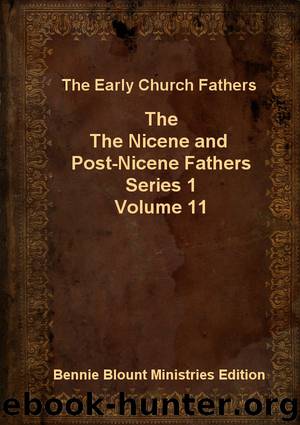Nicene and Post-Nicene Fathers Series 1 Volume 11 by Early Church Fathers

Author:Early Church Fathers [Fathers, Early Church]
Language: eng
Format: epub
Tags: Early Church Fathers
Publisher: Bennie Blount Ministries
Published: 0101-01-01T00:00:00+00:00
Homily XVI.
ROM. IX. 1.-"I say the truth in Christ, I lie not, my conscience also bearing me witness in the Holy Ghost."
Did I not seem yesterday to you to have spoken some great and exorbitant things of Paul's love toward Christ? And great indeed they were, too great for any words to express. Yet what you have heard to-day are as far above those things, as those things were above ours. And yet I did not think they could be exceeded, still when I came to what has been read to-day1 it did appear far more glorious than the whole of the former. And that he was aware of this himself he shows by his exordium. For as on the point of entering upon greater things than those, and therefore liable to be disbelieved by the generality, he first uses a strong asseveration about the matter he is going to speak of; which many are in the habit of doing when they are going to say somewhat which is not believed by the generality, and about which they feel the utmost certainty in their own minds. Hence he says, "I say the truth in Christ, I lie not, and my conscience beareth witness,"
Ver. 2, 3. "That I have a great heaviness and continual sorrow in my heart. For I could wish that myself were accursed from Christ."2
What sayest thou, O Paul? from Christ, thy beloved One, from Whom neither kingdom nor hell, nor things visible nor intelligible, nor another world as great, would separate thee, is it from Him that thou wouldst now be accursed? What has happened? Hast thou changed, hast thou given over that love? No, he replies, fear not. Rather I have even made it more intense. How then is it that thou wouldest fain be accursed, and seekest a separation, and a removal to such a distance, that after it there is no possibility of finding a more distant one? Because I love Him exceedingly, he may reply. How, pray, and in what manner? For the things seem a riddle. Or rather, if you will, let us learn what the curse is, and then we will question him upon these points, and shall understand this unspeakable and extraordinary love. What then is the curse? Hear his own words, "If any man love not our Lord Jesus Christ, let him be accursed." (anathema, 1 Cor. xvi. 22.) That is, let him be set apart from all, removed from all. For as in the case of a thing dedicated anaqhma, which is set apart for God, no one would venture so much as to touch it with his hand or even to come near it; so too with a man who is put apart from the Church, in cutting him off from all, and removing him as far off as possible, he calls him by this name anaqema in a contrary sense,3 thus with much fear denouncing to all men to keep apart from him, and to spring away from him.
Download
This site does not store any files on its server. We only index and link to content provided by other sites. Please contact the content providers to delete copyright contents if any and email us, we'll remove relevant links or contents immediately.
The Gnostic Gospels by Pagels Elaine(2527)
Jesus by Paul Johnson(2352)
Devil, The by Almond Philip C(2324)
The Nativity by Geza Vermes(2226)
The Psychedelic Gospels: The Secret History of Hallucinogens in Christianity by Jerry B. Brown(2149)
Forensics by Val McDermid(2088)
Going Clear: Scientology, Hollywood, and the Prison of Belief by Lawrence Wright(1977)
Going Clear by Lawrence Wright(1962)
Barking to the Choir by Gregory Boyle(1819)
Old Testament History by John H. Sailhamer(1809)
Augustine: Conversions to Confessions by Robin Lane Fox(1769)
The Early Centuries - Byzantium 01 by John Julius Norwich(1736)
A History of the Franks by Gregory of Tours(1720)
A Prophet with Honor by William C. Martin(1717)
Dark Mysteries of the Vatican by H. Paul Jeffers(1705)
The Bible Doesn't Say That by Dr. Joel M. Hoffman(1676)
by Christianity & Islam(1627)
The First Crusade by Thomas Asbridge(1601)
The Amish by Steven M. Nolt(1563)
